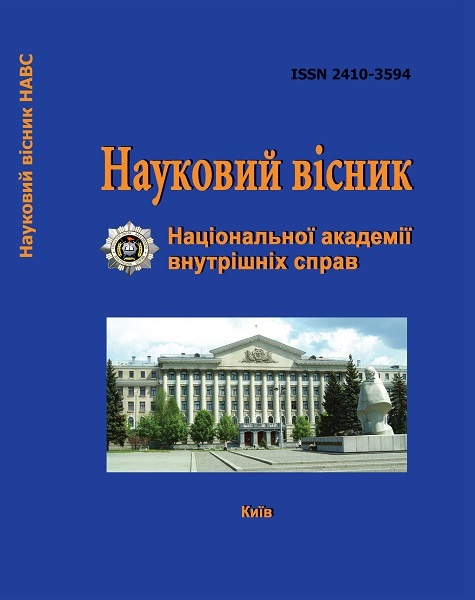Problems of Defense of a Subject for Crime
Abstract
The article is devoted to the attempt of finding the theoretical model of the subject of a crime, to analyze its definition with the account for the provisions of the Criminal Codes, which acted on the territory of Ukraine. The document contains a list of pre-revolutionary, Soviet and modern forensic scientists who have studied the issue of the subject of a crime. It is also indicated that a comprehensive study of a subject of a crime in domestic science of criminal law was not carried out, and the researchers determined some aspects of the subject of a crime or selectively limited the research topic with a certain group of crimes. The definition of the subject of the crime in the Criminal Codes, which acted on the territory of Ukraine, was characterized. It is stated that the concept of «subject of crime» covers the legally established and scientifically developed features of the crime. It is proven that the set of features on the basis of which a physical person who committed a socially dangerous act is subject to criminal liability, are part of the structure of the subject. It is noted that the absence of at least one feature of the subject excludes the possibility of qualifying the offense as a crime, and to determine a person as the subject of the crime. The scientific positions concerning the understanding and characteristics of obligatory characteristics of the subject of a crime are singled out. It is noted that suggestions on attaching the characteristics which characterize a person as a member of a society (thoughts, feelings, past actions of the person, its professional and public activity, merits to society, moral and political beliefs) to the subject of a crime cannot be considered reasonable. The scientific discussion about certain features of the crime is analyzed. The proposals for expanding the understanding of both the subject of a crime and its obligatory features are analyzed. It is determined that despite extensive research of the subject of a crime problematics both at the level of individual publications and at the level of relevant dissertational research, there are still unexplored directions and questions remaining.
Downloads
Abstract views: 84 PDF Downloads: 125
- Authors reserve the right to authorship of their own work and transfer to the magazine the right of the first publication of this work under the terms of the Creative Commons Attribution License, which allows other persons to freely distribute published work with mandatory reference to authors of the original work and the first publication of an article in this magazine.
- Authors have the right to enter into separate additional agreements on non-exclusive dissemination of the work in the form in which it was published in the journal (for example, to post an article in the institution's repository or to publish as part of a monograph), provided that the link to the first publication of the work in this journal is maintained.
- The journal's policy allows and encourages the posting of articles by authors on the Internet (for example, in electronic storehouses of institutions or on personal websites), both before the submission of this manuscript to the editorial office and during its editorial processing, as this contributes to the creation of a productive scientific discussion and positively affects the efficiency and dynamics of citing the published work.




